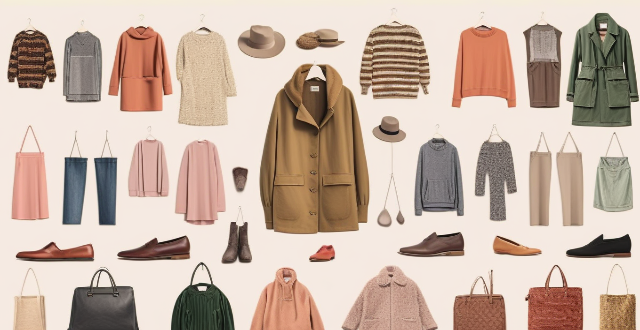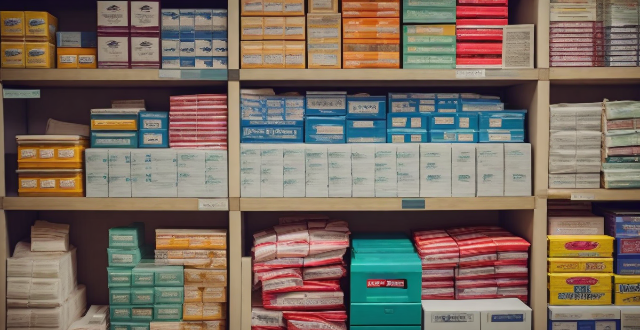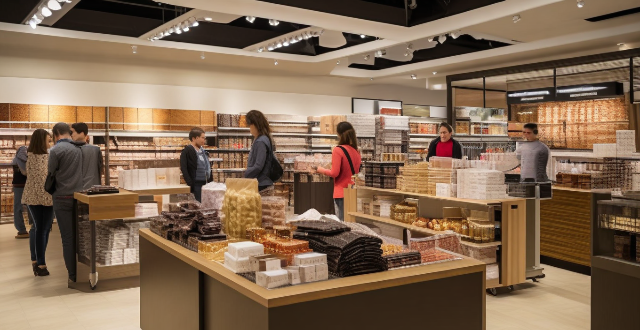Clothes Goods

Can I try on clothes at a sample sale ?
Attending a sample sale can be an exciting experience for fashion enthusiasts, as it often presents the opportunity to purchase designer clothing at discounted prices. However, one question that frequently arises is whether customers are allowed to try on clothes during these events. In this article, we will explore the intricacies of trying on clothes at a sample sale and provide some tips for making the most of your shopping experience.

What are some tips for washing clothes faster without compromising quality ?
Washing clothes faster without compromising quality is possible by following these tips: sorting clothes properly, using the right detergent, choosing the right wash cycle, not overloading the washer, and hanging dry when possible. These steps can save time, energy, and money while ensuring clean and fresh garments.

Where can I find discounted luxury goods without sacrificing quality ?
Luxury goods are often associated with high prices, but what if you could find them at a discount? It is possible to purchase luxury items without breaking the bank. Here are some places where you can find discounted luxury goods without sacrificing quality: 1. **Outlet Stores** - Outlet stores offer a wide range of luxury brands at discounted prices. These stores typically sell overstocked or slightly damaged items that are still of high quality. Some popular outlet stores include Neiman Marcus Last Call, Saks Off 5th, and Nordstrom Rack. 2. **Online Retailers** - Online retailers such as Amazon, Zappos, and Farfetch offer luxury goods at discounted prices. These retailers often have sales and promotions that allow you to save money on your purchases. Make sure to read reviews and check the authenticity of the products before making a purchase. 3. **Department Stores** - Department stores such as Macy's, Bloomingdale's, and Lord & Taylor often have clearance sales and end-of-season discounts on luxury goods. Keep an eye out for these sales and be prepared to shop early to get the best deals. 4. **Sample Sales** - Sample sales are events where designers sell their sample clothing and accessories at deeply discounted prices. These sales are often exclusive and require an invitation or registration to attend. Check websites such as Gilt, Rue La La, and 260 Sample Sale for upcoming sample sales in your area. 5. **Consignment Shops** - Consignment shops sell gently used luxury goods at a fraction of the original price. These shops typically have a rigorous selection process to ensure the quality of the products they sell. Look for reputable consignment shops in your area and be prepared to spend some time searching for the perfect item. 6. **Auction Houses** - Auction houses such as Sotheby's and Christie's often auction off luxury goods from estate sales and private collections. These items are typically in excellent condition and come with a certificate of authenticity. Keep an eye out for upcoming auctions and be prepared to bid competitively to secure your desired item. 7. **Travel Retailers** - Travel retailers such as Duty Free Americas offer luxury goods at discounted prices for travelers. These retailers often have exclusive promotions and discounts that are not available elsewhere. Plan your travel itinerary accordingly and make sure to visit these retailers during your trip. In conclusion, finding discounted luxury goods without sacrificing quality is possible if you know where to look. By visiting outlet stores, online retailers, department stores, sample sales, consignment shops, auction houses, and travel retailers, you can score amazing deals on luxury items that will make you feel like a million bucks without spending a fortune.

Are duty-free goods genuine or are they often counterfeit ?
Duty-free goods are often seen as a way to save money on luxury items, but the question of their authenticity arises for many travelers. Most duty-free shops operate under strict government regulations and have reputational incentives to sell genuine products. However, instances of counterfeit goods have been reported, often due to supply chain issues or fraudulent practices. To ensure you are purchasing genuine items, it's important to research before traveling, purchase from reputable sources, inspect the product carefully, and beware of unusually low prices. By exercising caution and remaining vigilant, you can enjoy the benefits of duty-free shopping with peace of mind.

How do I authenticate a designer bag when shopping for luxury goods online ?
This comprehensive guide provides essential tips for verifying the authenticity of designer bags when shopping online. It emphasizes the importance of researching the seller, examining product images, requesting certificates of authentication, and understanding common signs of counterfeits. Additionally, it suggests considering professional authentication services and using secure payment methods. By following these steps, shoppers can ensure they are purchasing genuine luxury goods and avoid falling victim to counterfeit products.

What are the best ways to wash clothes quickly and effectively ?
This article discusses the best ways to wash clothes quickly and effectively. It covers preparation steps such as sorting clothes, pre-treating stains, and checking pockets. It also explains how to set up a washing machine with the right cycle, warm water, and detergent. Handwashing clothes is another option that involves soaking clothes in warm water with detergent, scrubbing gently, rinsing thoroughly, and hanging to dry. After washing, drying clothes properly is important to prevent wrinkles and damage. Overall, following these steps can help you save time and keep your clothes clean and fresh.

Are there any shopping apps that specialize in selling handmade or artisanal goods ?
There are several shopping apps that specialize in selling handmade or artisanal goods, providing a platform for artisans and craftsmen to showcase their unique creations and reach a wider audience. Some of the popular shopping apps that focus on handmade or artisanal goods include Etsy, ArtFire, Aftcra, and Zibbet. These apps offer various features such as handpicked collections, personalized recommendations, studio membership, promotional opportunities, customizable shopfronts, mobile accessibility, American-made guarantee, community engagement, quality assurance, seller support, free listings, live chat, social integration, and mobile responsiveness.

Is there a difference in the tax refund process between goods for personal use and commercial resale ?
The tax refund process for goods varies based on whether they are purchased for personal use or commercial resale. Personal use items may qualify for tax-free shopping, deductions as expenses, or retail returns. Commercial resale goods often benefit from sales tax exemptions, input tax credits, export refunds, and inventory write-offs. The key differences include sales tax treatment, deduction eligibility, refund mechanisms, and documentation requirements.

What are some quick and easy ways to get my clothes clean ?
Here are some quick and easy ways to keep your wardrobe fresh and clean: 1. Spot Cleaning: For small stains or spills, dampen a cloth with water or a mild detergent and gently blot the affected area until the stain is removed. 2. Hand Washing: Fill a sink or basin with warm water and add a small amount of gentle detergent. Gently agitate clothing items in the water, then rinse thoroughly and hang to dry. 3. Machine Washing: Sort clothes by color and fabric type before washing. Use a gentle cycle and cold water for delicate items, and warmer water for more durable fabrics. 4. Dry Cleaning: Check care labels on garments made from silk, wool, or other delicate materials. If dry cleaning is recommended, take clothes to a professional dry cleaner. 5. Air Drying: Hang clothes outside on a clothesline or indoors on a drying rack to save energy and prolong their lifespan. This method also helps eliminate wrinkles and static cling. 6. Steaming: Hang clothes in a steamy bathroom after a shower or use a handheld garment steamer to remove wrinkles and odors. By incorporating these methods into your routine, you can keep your wardrobe looking its best without spending hours on laundry day.

What are the advantages of shopping for luxury goods at department stores versus boutiques ?
When it comes to shopping for luxury goods, consumersWhen it comes to shopping for luxury goods, consumers choosing between department stores and boutique there are several advantages to shopping at department stores that make them a popular choice for many luxury shoppers. These advantages include a wider variety of brands and products, one-stop shopping experiences, competitive pricing, excellent customer service, flexible return policies, loyalty programs, promotions and sales events, convenience, online shopping options, and gift registry services. Overall, department stores offer a compelling option for luxury shoppers looking for quality, value, and ease of purchase.

How can I make money by selling my used goods ?
Selling used goods is a great way to declutter your home and make some extra cash. Here are the steps you can follow to successfully sell your used items: 1. Determine what to sell by going through your belongings and deciding which ones you no longer need or use. You can sell anything from clothes and electronics to furniture and books. 2. Research the market value of your items by checking online marketplaces like eBay, Craigslist, or Facebook Marketplace to see how much similar items are selling for. This will help you price your items competitively. 3. Clean and repair your items before listing them for sale. Make sure they are in good condition and free of any damages or flaws that could affect their value. 4. Take high-quality photos of your items using natural lighting and a neutral background. Include multiple angles and close-ups of any unique features or details. 5. Write a compelling description that is honest about the item's condition and provides as much detail as possible, including brand, size, color, and any relevant history or stories associated with the item. 6. Choose a selling platform that best suits your needs and target audience, such as eBay, Craigslist, or Facebook Marketplace. 7. Price your items appropriately by considering their condition, age, and demand. Be open to negotiation and be willing to adjust your price if necessary. 8. Promote your listings on social media platforms like Facebook, Twitter, and Instagram to reach a wider audience. Join local buy-and-sell groups on these platforms to connect with potential buyers in your area. 9. Be responsive to buyers when they express interest in your item. Answer any questions they may have and provide additional information if needed. Building trust with potential buyers will increase the likelihood of completing a successful transaction. 10. Arrange for pickup or delivery (if applicable) with the buyer. Make sure to communicate clearly about timing and location details to ensure a smooth transaction process.

How do I invest in second-hand luxury goods ?
Investing in second-hand luxury goods requires careful consideration and research. Here are some steps to help you get started: 1. Determine your investment goals. 2. Research the market. 3. Choose the right platform. 4. Inspect the items carefully. 5. Negotiate the price. 6. Maintain the items properly.

Is it worth buying luxury goods during seasonal sales ?
Purchasing luxury items during seasonal sales can be a smart move if approached thoughtfully. Discounts, incentives, and access to newer styles are among the benefits, while quality concerns, limited selection, and impulse buying risks are potential downsides. Before investing, consider personal need versus want, financial responsibility, and do thorough research. A luxury good’s value ultimately lies in the enhancement it brings to one's life.